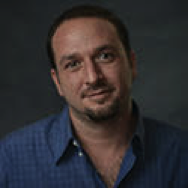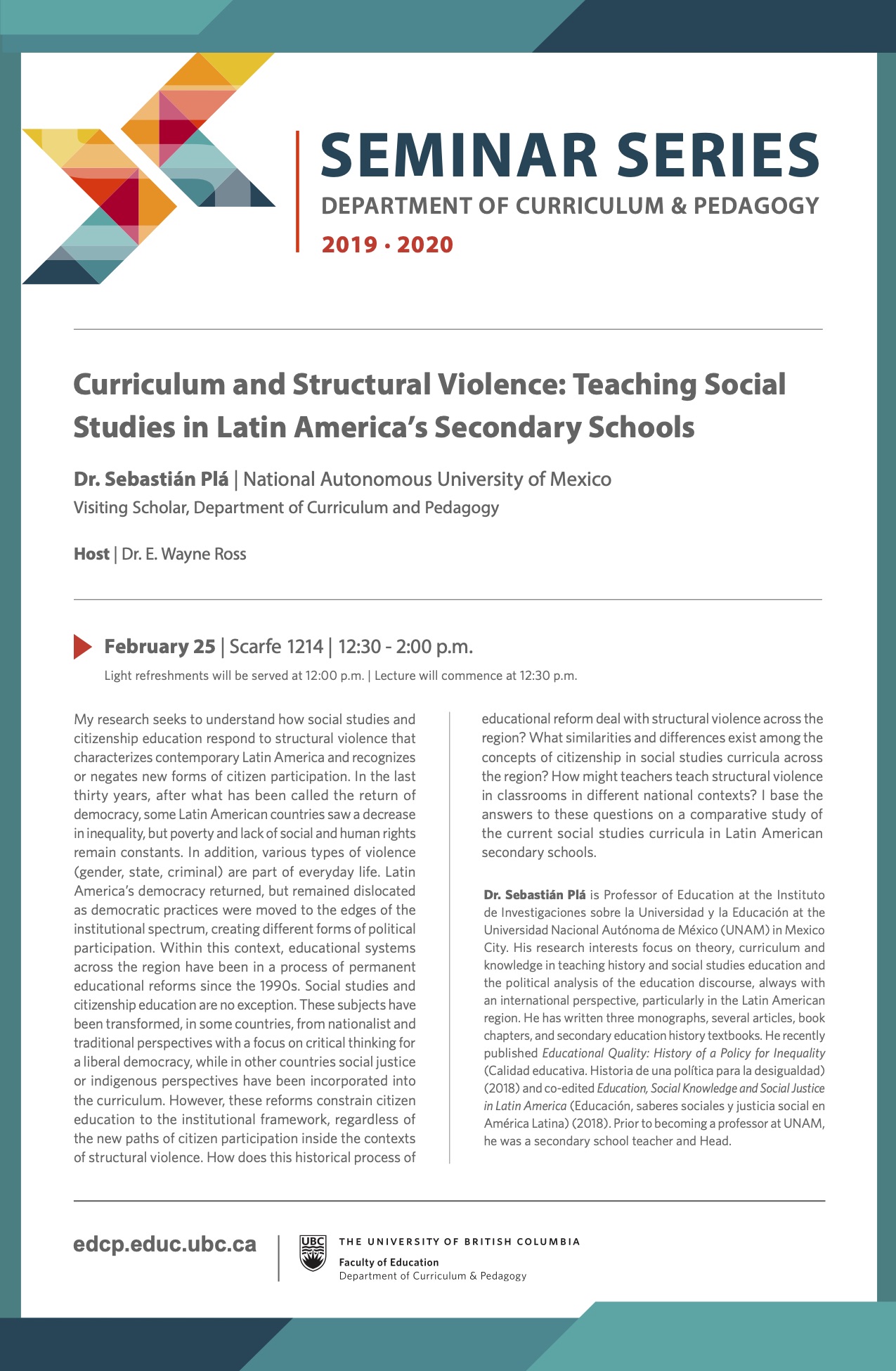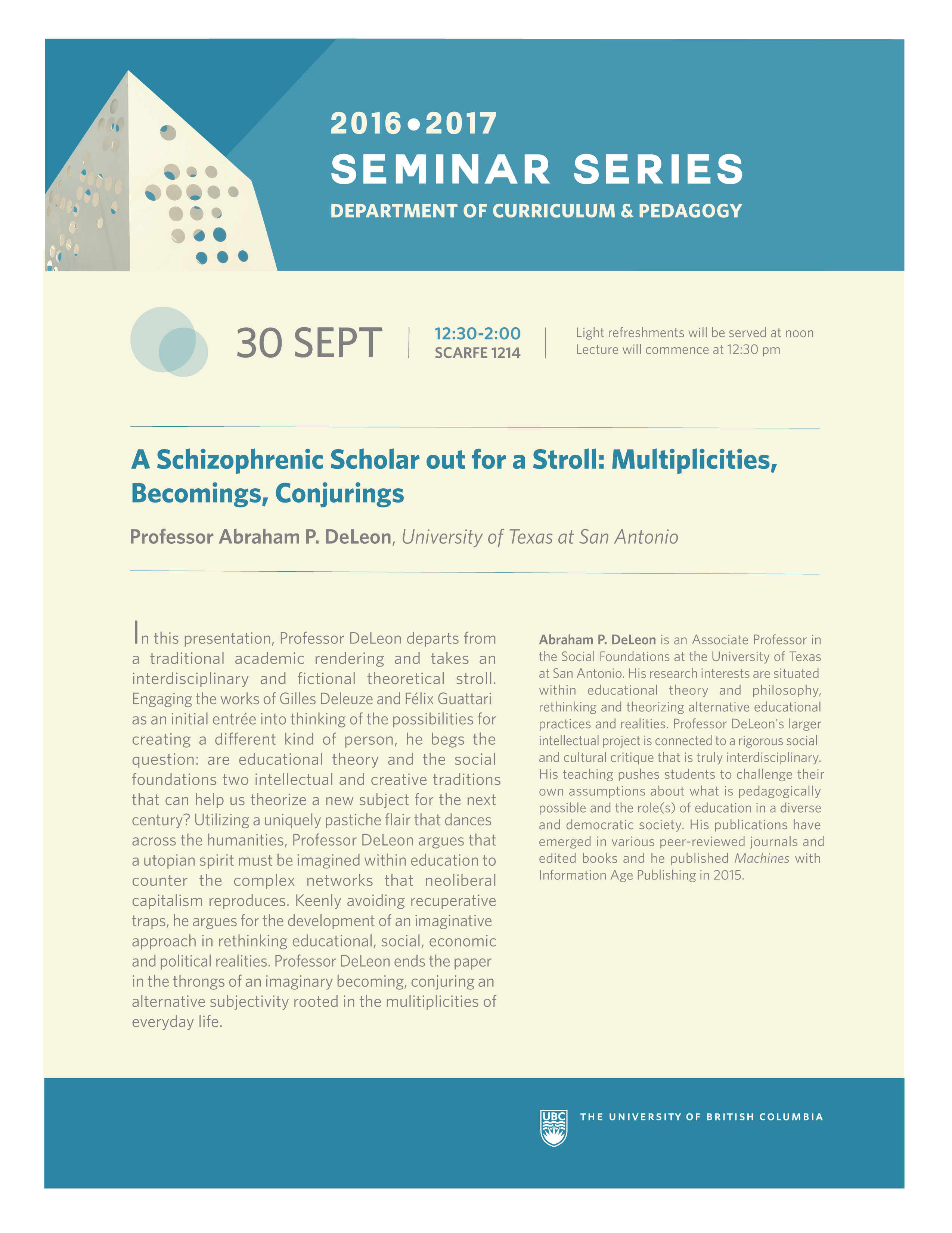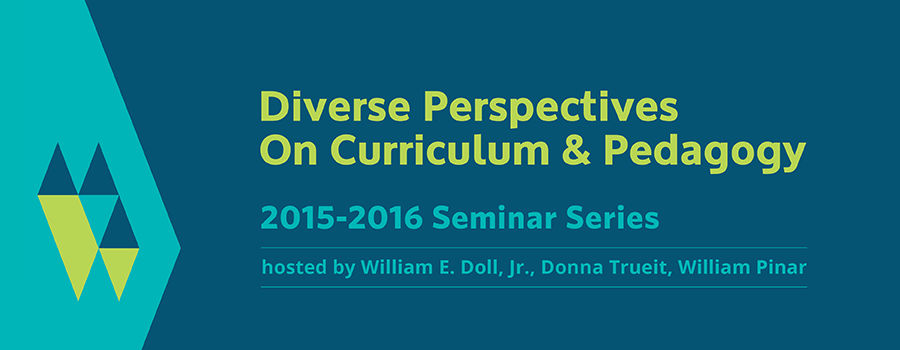-
Recent Posts
- New issue launch Workplace: A Journal for Academic Labor #35 (2024-2025)
- New issue of Critical Education (vol 16 no 2, Feb. 1 2025)
- New issue of Critical Education (vol. 15 no. 4, 2024)
- Call for Submissions: Heed the Call of the Dreamers! Imagination and the Frontiers of Critical Scholarship
- Critical Education: Call for manuscript reviewers
Recent Comments
- E Wayne Ross on The Courage of Hopelessness: Democratic Education in the Age of Empire [Video]
- George Rammell on The Courage of Hopelessness: Democratic Education in the Age of Empire [Video]
- Shannon M on BC elementary school bans touching at recess #NoMoreTag #bced #yteubc #occupyeducation
- SD61 Board Meeting, June 17, 2013: The Record Off The Record: It Sounds So Nice | Lined Paper on BC schools face total budget shortfall of $130 million #bcpoli
- Monday Memo – June 3, 2013 | Surrey Teachers Association on BC Teachers Federation scores landmark victory in academic freedom and freedom of expression #bcpoli
Archives
- May 2025
- January 2025
- November 2024
- October 2024
- September 2024
- January 2024
- October 2023
- August 2023
- December 2020
- May 2020
- March 2020
- January 2020
- August 2017
- March 2017
- February 2017
- January 2017
- September 2016
- July 2016
- May 2016
- February 2016
- January 2016
- October 2015
- June 2015
- April 2015
- February 2015
- January 2015
- May 2014
- November 2013
- October 2013
- September 2013
- August 2013
- July 2013
- June 2013
- May 2013
- April 2013
- March 2013
- February 2013
- January 2013
- December 2012
- November 2012
- October 2012
- August 2012
- July 2012
- June 2012
- May 2012
- April 2012
- March 2012
- February 2012
Categories
- Academic freedom
- Adjuncts
- Administration
- BC Education
- Budgets & Funding
- CAUT
- CFPs
- Civil Liberties
- Commentary
- Conferences
- Contracts
- Corporate University
- Critical Education
- Disputes
- Environment
- Equity
- Ethics
- Faculty
- Free speech
- Governance
- Government
- Idle No More
- Job cuts
- K-12 issues
- Layoffs
- Legal issues
- Organizing
- Privatization
- Protests
- Publishing
- Research
- Salary/Economic Benefits
- Strikes & Labor
- Student Movement
- Student Speech
- Students
- Talks and seminars
- Teachers
- Tenure & Promotion
- Testing
- Textbooks
- Uncategorized
- Unions
- University Presidents
- Violence
- Working condition
Meta
-
Tag Archives: UBC
Dr. Sebastián Plá | “Curriculum and Structural Violence: Teaching Social Studies in Latin America’s Secondary Schools”
Tagged curriculum, EDCP, structural violence, talks, UBC, Violence
ICES Seminar: Curricular ideologies in the discussion and negotiation of the Chilean social studies curriculum
Institute for Critical Education Studies
Open Seminar
Monday, September 26, 2016
Noon – 1:oopm
Scarfe 1209
University of British Columbia
Curricular Ideologies in the Discussion and Negotiation of the Chilean Social Studies Curriculum
 Renato Gazmuri, PhD
Renato Gazmuri, PhD
Assistant Professor at Universidad Diego Portales (Chile). Dr. Gazmuri received his PhD at the Autonomous University of Barcelona (Spain)
Abstract: The Chilean social studies curriculum has been defined through processes of discussion and negotiation between diverse actors and institutions with different views on the subject. In order to identify and describe these ideologies, a sequential and recursive methodological device was designed and applied in three stages of production and analysis of information: a documentary compilation around three curricular events of debate and negotiation, application of questionnaires, and interviews. At each stage a content analysis was performed. Five curriculum ideologies are identified and described, considering their assumptions about how the curriculum should define the subject matter, as well what its aims, contents and its guidelines for teaching.
EDCP Seminar: Abraham DeLeon “A Schizophrenic Scholar out for Stroll: Multiplicities, Becomings, Conjurings”
Tagged Abraham DeLeon, Curriculum and Pedagogy, EDCP, Research, seminar, talks, UBC, UTSA
The Courage of Hopelessness: Democratic Education in the Age of Empire [Video]
Dr. E. Wayne Ross | Professor, EDCP
January 15, 2016
Short Bio:
E. Wayne Ross is Professor in the Department of Curriculum and Pedagogy at UBC. He has written and edited numerous books including: Critical Theories, Radical Pedagogies and Social Education (Sense, 2010); The Social Studies Curriculum: Purposes, Problems and Possibilities (4th Ed., SUNY Press, 2014) and Working for Social Justice Inside and Outside the Classroom (Peter Lang, 2016). He also edits the journals Critical Education, Workplace: A Journal for Academic Labor, and Cultural Logic.
Abstract:
In this talk I argue there is a disconnect between the rhetoric and reality of democracy in North America that subverts traditional approaches to democratic education. The tropes that have historically dominated the discourse on democracy and democratic education now amount to selling students (and ourselves) a lie about history and contemporary life. Our challenge is to re-imagine our roles as educators and find ways to create opportunities for students to create meaningful personal understandings of the world. Education is not about showing life to people, but bringing them to life. The aim is not getting students to listen to convincing lectures by experts, but getting them to speak for themselves in order to achieve, or at least strive for an equal degree of participation and a more democratic, equitable, and justice future. This requires a new mindset, something I call dangerous citizenship.
Steven Salaita – First Peoples, Palestine, and the Crushing of Free Speech (Talks at SFU & UBC)
First Peoples, Palestine, and the Crushing of Free Speech
Monday, January 12 at 7:30pm
SFU Harbour Centre, 515 West Hastings Street, Segal Rooms; Vancouver, BC
Facebook EVENT
Wednesday, January 14 at 5:00pm
Coach House at Green College, UBC; 6201 Cecil Green Park Road (off NW Marine Drive, opposite Chan Centre and Rose Parkade)
Facebook EVENT
A talk by Professor Steven Salaita, who is at the centre of an international protest against academic censorship.
Salaita, author of six books and many articles, was “unhired” from a tenured position in American Indian studies at the University of Illinois when donors pressured the university because of Salaita’s tweets on his personal Twitter account about the Gaza massacre last summer.
Because this action is widely recognized as part of a broad effort to silence voices for Palestinian rights and justice, and as one incident in the long history of colonial treatment of indigenous peoples, the case has attracted international attention.
Salaita’s books will be available at this event.
“Steven Salaita & Academic Censorship“: an interview on Voice of Palestine


 Follow
Follow

